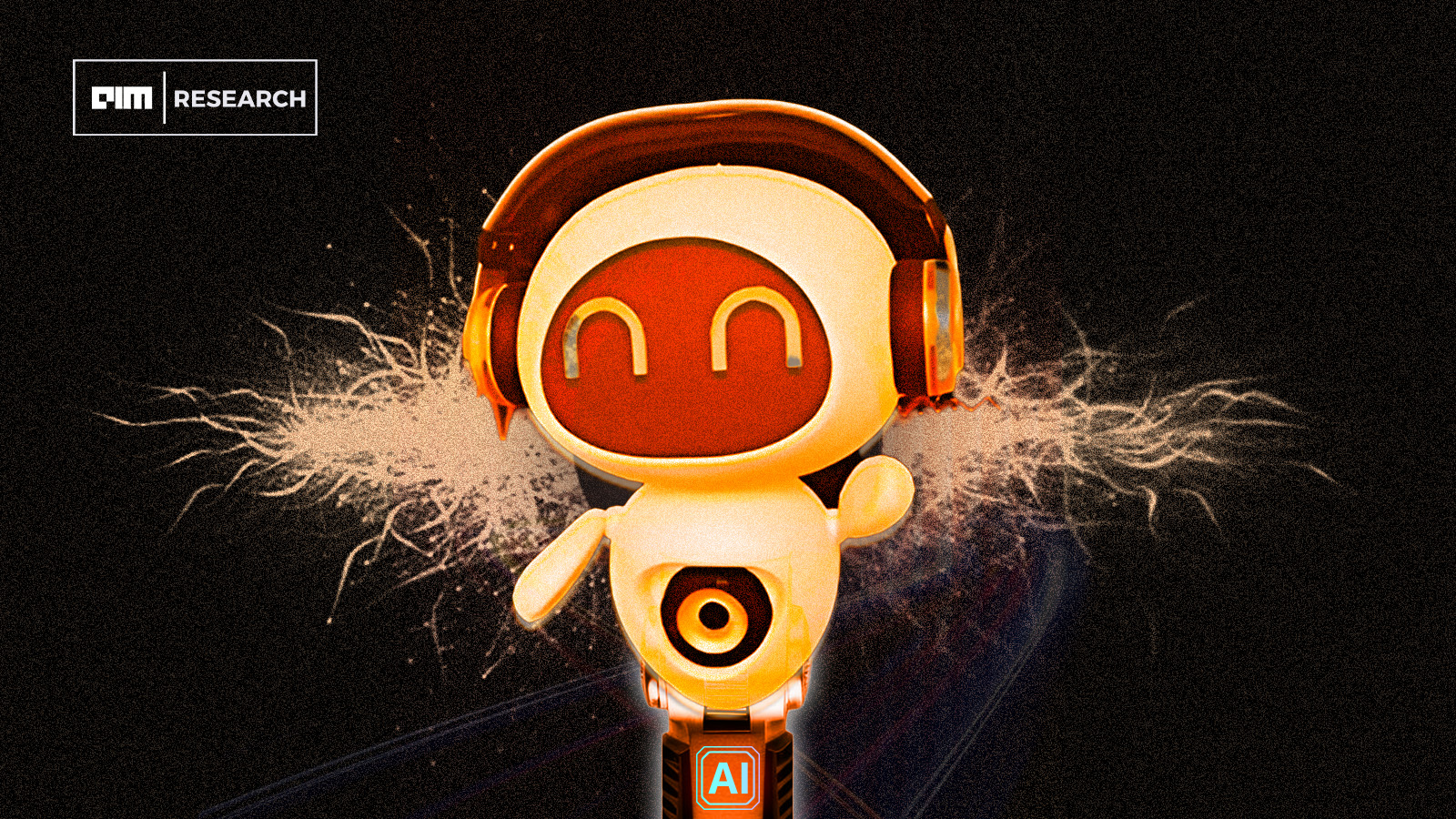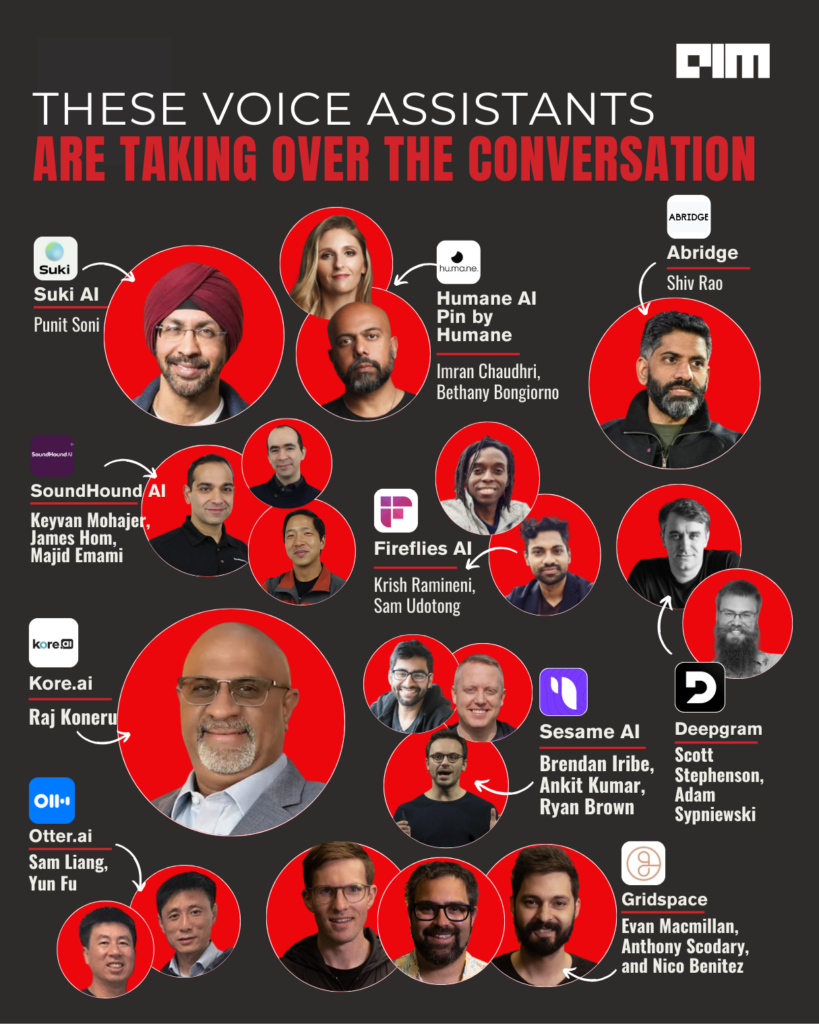
These Voice Assistants are Taking Over The Conversation
- By Upasana Banerjee
- Published on
AI voice assistants are the practical applications built using Voice AI


Speaking to machines is now an everyday reality, thanks to rapid advancements in Voice AI and AI voice assistants. Though they sound similar, these terms refer to different but connected layers of technology. Voice AI is the core technology that powers the ability of machines to understand and respond to spoken language. It includes tools like automatic speech recognition (ASR), natural language understanding (NLU), and text-to-speech (TTS) synthesis. Think of it as the engine that hears your voice, interprets what you mean, and speaks back. Companies like Deepgram specialize in building this foundational layer, providing developers with APIs to create intelligent voice experiences across call centers, mobile apps, and smart devices. On the other hand, AI voice assistants are the practical applications built using Voice AI. These assistants interact directly with users to carry out specific tasks. For example, Suki AI acts as a clinical assistant for doctors, transcribing patient conversations and generating medical notes to reduce burnout. Fireflies AI and Otter.ai are popular in business settings, where they automatically transcribe and summarize meetings. In customer service, Gridspace’s Grace handles routine support calls with emotional awareness, escalating complex cases to human agents when needed.

Suki is a healthcare technology startup reimagining clinical workflows with its AI-powered voice assistant, Suki Assistant. Designed to reduce the administrative load on physicians, the assistant uses ambient voice recognition and natural language processing to automatically generate medical notes from doctor-patient conversations. According to the company, this can cut documentation time by up to 72%, enabling clinicians to focus more on patient care. The company has raised $165 million to date, with major rounds including $20 million Series B in 2020 led by Flare Capital, $55 million Series C in 2021 led by March Capital), and a $70 million Series D in October 2024, led by Hedosophia. Now valued at $500 million, Suki is scaling its AI voice assistant for doctors, streamlining clinical notes and easing EHR workflows
The Humane AI Pin is a wearable device designed to function as a screenless, AI-powered assistant. Users interact with the AI Pin primarily through voice commands and touch controls. By tapping the touchpad on the device, users activate the assistant to perform tasks such as making phone calls, sending text messages, setting reminders, and retrieving information. The device also features a laser projector that displays information onto the user’s hand, providing a visual interface when needed. Unlike traditional voice assistants that rely on wake words, the AI Pin requires manual activation, ensuring it listens only when prompted. This design choice emphasizes user privacy by preventing the device from passively listening to conversations. Founded in 2019 by former Apple employees Imran Chaudhri and Bethany Bongiorno, the company is based in California.
Abridge is an AI-powered platform that functions as a voice assistant in healthcare settings by capturing and transcribing patient-clinician conversations in real-time. It utilizes advanced speech recognition and natural language processing to convert these interactions into structured clinical notes, which can then be integrated directly into Electronic Health Record (EHR) systems like Epic.
Founded in 2018, Abridge has raised $430 million to date. It closed a $30 million Series B in 2023 led by Spark Capital, followed by a $150 million Series C in early 2024 led by Lightspeed, Redpoint, IVP, and a $250 million Series D in February 2025, co-led by Elad Gil and IVP, with participation from NVIDIA’s NVentures and CVS Health Ventures. The latest round valued Abridge at $2.75 billion.
SoundHound AI specializes in developing advanced voice assistant technologies that facilitate natural and responsive interactions across various industries. Their Houndify Developer Platform enables businesses to create customized voice assistants, offering components like personalized wake words and comprehensive content domains. In January 2017, SoundHound AI secured $75 million from investors including NVIDIA GPU Ventures and Samsung Catalyst Fund. This investment aimed to accelerate the growth and international expansion of its Houndify AI voice platform. By April 2023, the company obtained a $100 million strategic financing from Atlas Credit Partners. This funding was designated to support sustained rapid growth and innovation, with provisions to increase the amount to $125 million.
SoundHound AI’s voice assistant has been integrated into vehicles from brands such as Hyundai, Kia, and Stellantis, while it has deployed its AI voice technology in over 10,000 restaurant locations, collaborating with chains such as Chipotle and Panda Express.
Fireflies.ai is an AI-powered voice assistant that boosts productivity by automating meeting recordings, transcriptions, and analysis. It seamlessly integrates with popular virtual meeting platforms like Zoom, Google Meet, Microsoft Teams, and Webex. Fireflies automatically records and transcribes meetings, providing accurate and searchable transcripts that enable teams to efficiently review discussions, identify action items, and retain crucial information.
The AI-powered search function allows users to quickly find specific topics or decisions within meeting notes, and team members can collaborate by commenting on and sharing specific parts of conversations. Fireflies also integrates with productivity tools such as Asana, Slack, and Salesforce, automating workflows and enabling tasks to be created directly in Asana using voice commands during meetings.
Otter.ai is a powerful AI voice assistant designed to streamline communication and enhance productivity in professional settings. It automatically records, transcribes, and organizes meetings in real-time, working seamlessly across popular platforms like Zoom, Microsoft Teams, and Google Meet. With Otter.ai, users can stay focused on the conversation without the distraction of taking manual notes. The AI not only captures what is said but also identifies who said it, providing searchable transcripts and speaker identification. It also generates automatic meeting summaries, highlights key topics, and syncs with calendars to auto-join and record scheduled calls. It m mmmmnmmintegrates with tools like Slack and Dropbox, making it easy to share insights and maintain transparency across teams. Whether it’s for remote meetings, lectures, or interviews, Otter.ai acts as a smart voice companion that saves time, improves accuracy, and ensures that nothing gets lost in translation.
Kore.ai offers a comprehensive conversational AI platform that enables businesses to create advanced virtual assistants capable of managing both voice and text interactions. These assistants are designed to understand and respond to user queries, execute tasks, and facilitate transactions across multiple channels, including voice interfaces. A key component of Kore.ai’s offering is its Voice AI capabilities, which encompass features such as Automatic Speech Recognition (ASR), Text-to-Speech (TTS), and Voice Biometrics. These technologies allow for the development of voice-enabled virtual assistants that can comprehend spoken language, authenticate users through voice, and deliver natural-sounding responses. The platform supports integration with leading ASR and TTS engines, including Google Cloud, Azure, and Nuance, as well as compatibility with Interactive Voice Response (IVR) systems like Genesys, Avaya, and Cisco. This flexibility ensures that businesses can seamlessly incorporate Kore.ai’s voice assistants into their existing infrastructure.
Sesame AI’s groundbreaking Conversational Speech Model (CSM) is transforming the way people interact with voice assistants. Trained on nearly a million hours of audio, Sesame’s voice assistant can detect the user’s emotional state, respond appropriately with humor or care, and maintain fluid and engaging conversations. Unlike the robotic AI voices people are used to, it captures the nuances of real human conversation i.e. tone, rhythm, emotion, and even personality. It doesn’t simply respond to commands; it listens, understands context, and speaks back with warmth, empathy, and a truly expressive voice presence. Early demos have impressed users with how natural and lifelike the assistant sounds.
Deepgram isn’t a voice assistant in itself but it’s the powerful engine behind many of them. With its Voice Agent API, Deepgram gives developers the tools to build fast, natural-sounding, and intelligent voice assistants that can listen, think, and speak in real time. Its speech recognition and voice synthesis models allow AI agents to hold fluid, low-latency conversations, manage interruptions, and adapt to different user needs. Developers can integrate Deepgram with platforms like Twilio or layer in their own custom or open-source language models. This flexibility means Deepgram can support everything from customer service bots to intelligent agents in call centers, apps, or voice-enabled devices. By focusing on speed, scalability, and voice-first interaction, Deepgram is quietly becoming the voice behind the voices we’ll interact with more and more
Gridspace is redefining voice AI with its virtual agent, Grace, designed to bring emotional intelligence to automated customer service. Unlike traditional voice bots, Grace can detect and respond to human emotions in real-time, offering a more natural and empathetic conversation experience. This makes it particularly powerful in high-stress environments like contact centers, where customer frustration is common. Built for enterprise use, Grace is capable of handling routine inquiries 24/7 while escalating more complex cases to human agents when necessary. It integrates seamlessly into existing workflows, helping businesses increase efficiency without overhauling their systems. By combining cutting-edge speech recognition, natural language understanding, and emotional awareness, Gridspace positions Grace as a next-generation voice assistant tailored for modern customer support operations.
📣 Want to advertise in AIM Research? Book here >

Cypher 2024
21-22 Nov 2024, Santa Clara Convention Center, CA
A Vendor Briefing is a research tool for our industry analysts, and an opportunity for a vendor to present its products, services and business strategies to analysts who cover the vendor specifically or a related technology or market.
AIM Research encourages technology vendors and agencies to brief our team for PeMa Quadrants, when introducing a new product, changing a business model, or forming a partnership, merger, or acquisition.


